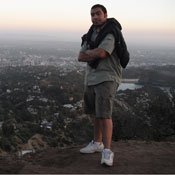Wednesday, February 23, 2011
Febuary 23, 2011
Hussein Sadek has had the bittersweet experience of watching a revolution in his homeland happen while he's away. Sadek, 23, is a junior at Jackson State University, studying for a degree in telecommunications engineering. He grew up in Giza, Egypt, near Cairo--the nation's capital and the recent revolution's epicenter.
When Sadek was home for his winter break, he spoke to his parents about the uprising in neighboring Tunisia. No one believed that anything similar could happen in Egypt, he says. A popular movement was brewing, however, fueled by frustration with the 30-year autocratic regime of President Hosni Mubarak.
On Jan. 25, thousands assembled in Cairo and other cities to protest police brutality, censorship, low wages and suppression of political dissent under Mubarak's regime. Those early protests quickly gained momentum and additional supporters, including Sakek's family and friends.
How did you get information about what was happening in Cairo?
The regime used the state TV to give fake information about the protests. One time I was watching the Egyptian TV over the Internet, and I heard that there were 2,000 protesters downtown. I called one of my friends--he was downtown--after the cell-phone service was back. I asked him, "How many are there of you?" He said, "I can't say there are less than 250,000."
On the 28th of January (the regime) tried to stop Facebook and Twitter because they were very effective. They tried to block them, but they found that people used proxies to go around this, so they said, "We are going to block the whole Internet, the whole traffic from the whole country."
The whole country (had) zero traffic. It was very, very rude to do that to the people. Internet is just like water and food now, so if you cut my Internet, what are you planning to do? Are you going to do anything that you don't want the world to know about?
So you had to call home?
Land lines were working, so I called my parents through land lines. I wasn't able to contact my sister and brother because they were in the streets. During the day, I was calling three or four times, just to make sure everything was OK. It was very expensive.
How did you find out that Mubarak had finally stepped down?
I had an exam on (Feb. 11), and I wasn't able to sleep, because I knew after (his) speech on Thursday that the country was going to boil big time. They had spread rumors that he was going to step down. And in his speech, he said: "I'm not going to step down. I'm going to hand over all my authorities to my vice president." If he did that on the Friday of (Rage), the 28th of January, we would've accepted it, but now we didn't trust him, we didn't trust his vice president, we didn't trust his government. We needed everybody to get out.
After that, I was in an exam, and I received a whole lot of e-mails on my phone, and text messages. My phone didn't stop vibrating, and I wasn't able to know what was going on. So after the exam I, pulled out my phone and I had, like, 40 e-mails, 25 messages, and a lot of missed calls. And all of them said, "Congratulations." I didn't know--congratulations for what? I called my mom and asked her, "What's going on?" She said, "He stepped down." They said the military's going to take over. We kind of trust the military more than the policemen.
That's something that's hard for Americans to understand. The military in Egypt has a different role than in the U.S., doesn't it?
It's independent from the police. I have to serve in the military. ... The military is our family. A lot of my friends are in the military. It's kind of like when you trust something because you know people inside it.
What does it feel like for you to be here in Mississippi right now?
I wish I was there. It's pride; it's dignity; it's a lot of things. ... There are people who just wait for things to happen, there are people who make things happen, and there are people who like watching what's going on and then jump on the team they want. I wanted to participate.
I was able to contact the media over here to talk about what's going on. Especially when the Internet was out, I was like, "OK, I'm not going to just stay here and watch what's going on. I'm going to speak to media," because the only thing they knew was the Egyptian state TV, which was fake information. That was the only role I found (for) myself.
I really cried when I saw a sign in downtown (Cairo) from a kid of 7 years. He wrote on this sign, "Finally I can dream of being president." With this regime, we weren't able to dream about being a minister or being president. If your teacher asked you what you dream about, and you said being president, they'd laugh at you.

Comments
Use the comment form below to begin a discussion about this content.
Sign in to comment
Or login with:
OpenID